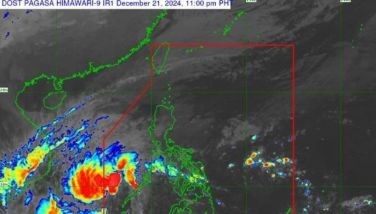Town bans pooping in the fields, bushes
CEBU, Philippines — The absence of toilets among households is common in rural areas in the country. But one town in southern Cebu is pushing the envelope.
In Sibonga, a town located about 60 kilometers south of Cebu City, discharging human wastes in open spaces is now illegal.
The municipal government now prohibits residents or transients from leaving their waste in open spaces as they may expose people to sanitation hazards.
Access to water and sanitation for all is among the Sustainable Development Goals world leaders have committed to achieve by 2030. The United Nations estimated that 2.4 billion people around the world lack access to basic sanitation services, such as toilets or latrines.
A UN report said that more than 80 percent of wastewater resulting from human activities is discharged into rivers or sea without any pollution removal.
Under Sibonga’s newly-passed ordinance on “zero open defecation,” people there must only discharge waste in toilet rooms. This means, all households are now required to have their own toilets.
It shall be considered unlawful for any household to have no toilet facility.
Open defecation refers to the manner of discharging human waste at an “open” space or a place or location other than the toilet, comfort room, or rest room.
Throwing or leaving human waste in open places is also banned.
Violators of the ordinance will be slapped with a fine ranging from P500 for first offense to P1,000 for second offense, and a punishment of a community service at the barangay.
Meanwhile, a fine of P2,500 shall be imposed on households that do not have a toilet facility six months after they have been given notice.
The policy also applies to non-residents. This means, that visitors, too, should be careful about disposing of their waste within the town.
According to the ordinance, each village is ordered to create its own Barangay Sanitation Control System.
The villages shall then create a special body to implement the barangay sanitation programs.
The officers are tasked to assist in enforcing the policy, dealing with violators, and imposing the corresponding penalties.
The body shall be headed by the barangay chairman and assisted by the barangay midwife; the members shall be the barangay kagawad (in charge of the Committee on Health) and barangay health workers.
Aside from stipulating fines and penalties, the ordinance also provides for the yearly funding to sustain the program.
The local funds will be appropriated under the Municipal Health Office, which will facilitate and oversee the implementation of the program.
Approved in the last quarter of 2018, the municipal government will undertake a massive information drive to introduce the new rule among residents.
About two and a half-hour drive from the city, Sibonga is a third income-class municipality comprised of 25 barangays. In the 2015 census, the town had a population of 48,000 people. —/JMD (FREEMAN)
- Latest























